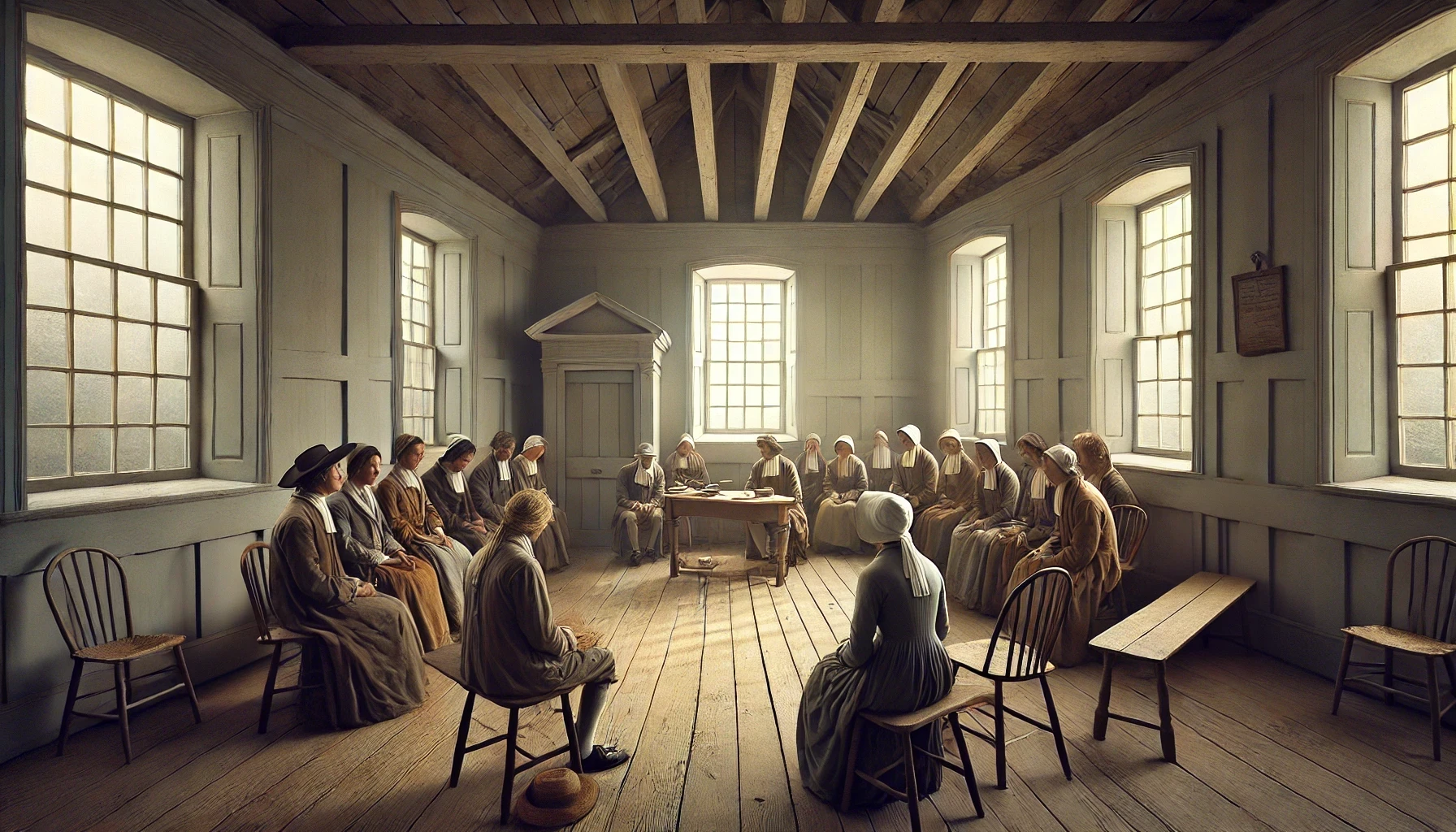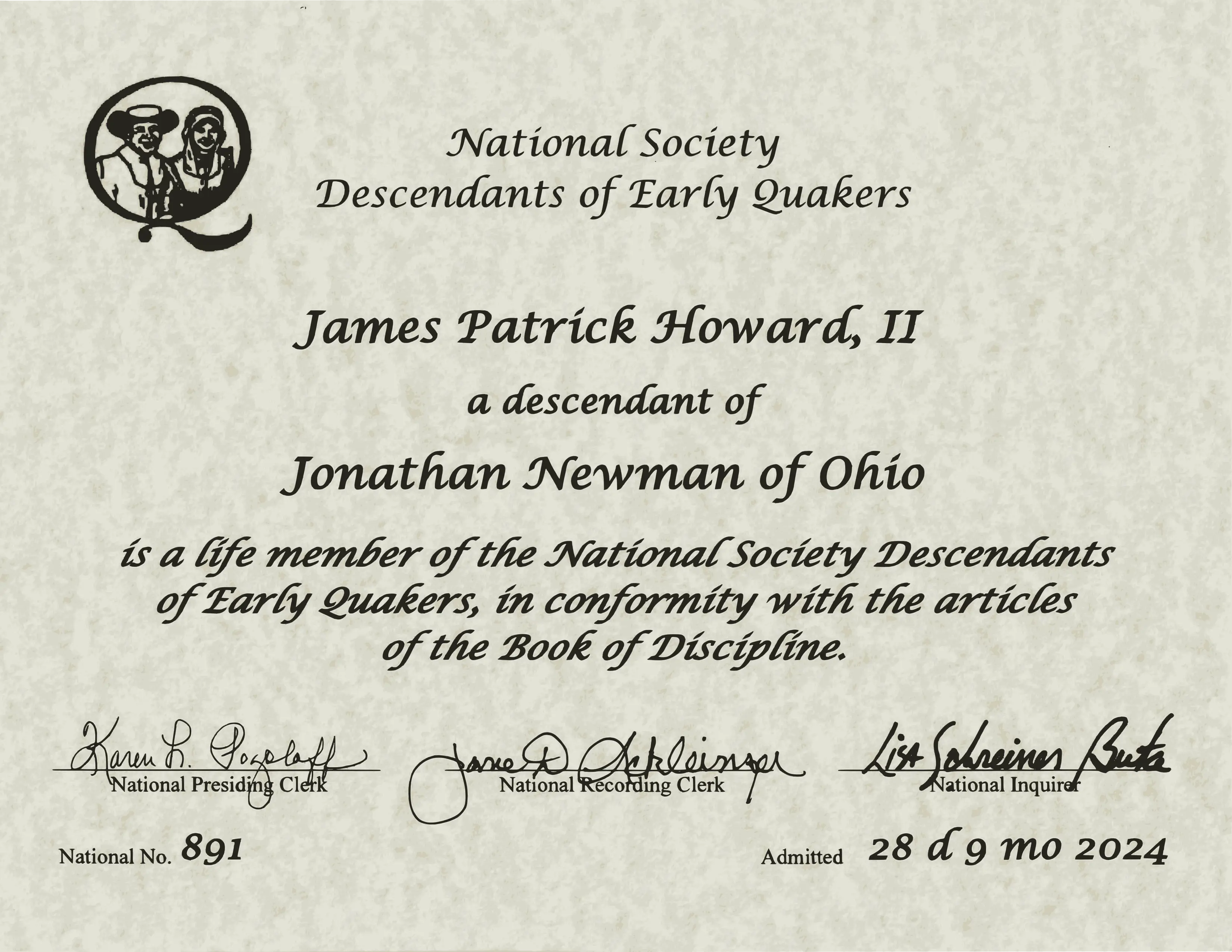What Makes a Quaker a Quaker
Thursday October 03, 2024


Growing up, I always had a vague understanding of Quakers—mostly tied to their impact on political and social movements. Recently, though, I discovered that my mother’s family has deep Quaker roots, with numerous ancestors belonging to this community. This led me to a deeper exploration: What exactly made them Quakers, beyond a mere mention in the pages of history? What did they believe, how did they live, and what has this heritage passed on to me?
The Religious Society of Friends, or Quakers, was born during the mid-17th century in England, a period of intense social and religious upheaval. George Fox, often considered the founder, felt that the established churches had strayed from a true relationship with the divine. He emphasized a direct experience with God—an idea that did not require clergy, rituals, or any intermediaries. This radical notion led to the formation of a community that would come to be known as Quakers, a term originally coined in derision because they would “quake” during moments of spiritual ecstasy. Over time, however, this term came to be embraced by the Friends themselves.
At the core of Quakerism is the concept of the “Inner Light”, which holds that everyone has within them a divine presence—a spark of God that does not require a church or a priest to mediate. Instead, each person can access this Inner Light through personal contemplation, reflection, and connection. This belief alone was revolutionary in 17th-century England, where the church hierarchy held immense power, and the idea that each individual could directly commune with God was considered almost heretical. For my Quaker ancestors, this emphasis on a direct, personal experience of the divine shaped their worldview, giving them an intense focus on equality and a deep respect for every human being.
The practice of worship among Quakers reflects this belief. Traditional Quaker meetings are held in silence. The community gathers without a pastor, and anyone moved by the Spirit is free to speak. This form of worship emphasizes the importance of listening—to God, to oneself, and to each other. In the quietness of a Quaker meeting, there is a collective waiting, a spiritual openness that allows the divine presence to guide the community. This approach stands in stark contrast to the structured liturgies of other Christian denominations, and I imagine that the power of this silent, egalitarian space must have left a profound imprint on my ancestors’ understanding of faith and community.
Quaker beliefs are not only about worship but also about how one lives in the world. Their values are often described using the acronym SPICES: Simplicity, Peace, Integrity, Community, Equality, and Stewardship. These guiding principles are called “testimonies” because they represent how Quakers testify to their beliefs through their actions.
Simplicity is perhaps one of the most recognizable aspects of Quaker life. Historically, this meant living plainly, avoiding excess, and focusing on what truly mattered. Quakers wore simple clothing, spoke plainly, and sought to live without unnecessary distractions. This focus on simplicity extended beyond material goods; it was also about simplicity of purpose, living a life that remained close to one’s spiritual values. As I explored my family history, I began to see how this simplicity might have been a thread running through the lives of my ancestors, encouraging them to value community and spirituality over material success.
Peace is another fundamental tenet. Quakers are known for their commitment to nonviolence and have historically been conscientious objectors, choosing imprisonment over military service during times of war. The Quaker Peace Testimony is not just about avoiding war; it is a commitment to resolving conflicts peacefully in all aspects of life. In examining the lives of my ancestors, I wonder how they managed to uphold this belief in times of conflict, especially when pacifism went against the prevailing attitudes of society.
Integrity, for Quakers, means being true to oneself and being honest in all dealings. It means that words and actions align, and it involves a deep commitment to truth, regardless of the consequences. This insistence on integrity extended to every area of life, from business dealings to personal relationships. Quakers were known for their honesty and fairness, which contributed to their reputation as trustworthy merchants and bankers.
The emphasis on community is evident in how Quakers organized their early settlements, particularly in America. Many Quakers came to the American colonies to escape persecution in England. William Penn, a prominent Quaker, founded Pennsylvania as a place where Friends and others could live according to their beliefs without fear of harassment. Quakers worked together to create supportive communities that helped those in need, educated their children, and worked for social reforms that benefited everyone.
The testimony of equality might be one of the most striking of all. From the beginning, Quakers believed that all people were equal in the eyes of God. This meant that they actively worked against the institution of slavery and were among the first to advocate for abolition in America. Their commitment to equality also meant that women were granted equal status within the community, and they could speak, lead, and hold authority in ways that were highly unusual for the time. This deep-rooted belief in equality resonates with me, especially when I think about my ancestors living in a society where such views were far from mainstream.
Finally, stewardship, the care for God’s creation, reflects the Quaker belief that the Earth is a sacred gift and that we are responsible for taking care of it. This sense of stewardship is reflected in how Quakers have often been at the forefront of environmental advocacy, seeking to protect natural resources and live sustainably.
One of the fascinating aspects of exploring Quaker beliefs is comparing them to other spiritual traditions. Given my background in Buddhist studies, I cannot help but see interesting parallels between Quakerism and Buddhism and some striking contrasts. Both traditions emphasize a direct personal experience—Quakers through the Inner Light and Buddhists through meditation and insight into the nature of reality. In both, there is an emphasis on simplicity. Quakers practice simplicity to focus on the divine, while Buddhists value simplicity as a way to reduce suffering caused by desire and attachment.
The focus on peace is another commonality. The Quaker Peace Testimony finds its counterpart in the Buddhist principle of ahimsa, or nonviolence, which is central to many Buddhist teachings. Both traditions uphold the importance of not harming others, whether in thought, word, or deed. This commitment to nonviolence is deeply embedded in both faiths and has shaped their respective approaches to social justice.
However, there are also important differences. Quakerism is fundamentally theistic; the belief in a personal God who communicates with individuals is core to their faith. Buddhism, on the other hand, is nontheistic. The goal in Buddhism is not to connect with a divine being but rather to achieve enlightenment, a deep understanding of the nature of suffering and the path to its cessation. Where Quakers might gather in silence to listen for God’s voice, Buddhists meditate to quiet the mind and see reality more clearly.
The communal aspect of Quaker worship also differs from Buddhist practice. Quaker meetings are collective and egalitarian, emphasizing the shared experience of waiting for divine guidance. While there are communal aspects to Buddhism, especially in monastic settings, meditation is often seen as a personal journey toward enlightenment, even when done in a group. The silence of a Quaker meeting is filled with the potential for spontaneous revelation, while the silence in Buddhist meditation is about deep introspection and mental discipline.
Reflecting on these similarities and differences has deepened my understanding of both traditions. It makes me appreciate the unique synthesis of values that my Quaker ancestors held—values that also find echoes in the Buddhist teachings I have studied. Both traditions, in their own ways, are committed to peace, to the pursuit of truth, and to living in harmony with the world. They diverge in their cosmologies but converge in their insistence that each individual has the capacity for profound insight and transformation.
Learning about my Quaker ancestry has given me a new perspective on the values that my family may have quietly passed down. The emphasis on simplicity, honesty, community, and equality feels familiar, like an inheritance that has shaped how I view the world, even if I was unaware of its source. In a world that often feels increasingly complicated, divided, and focused on material success, there is something incredibly grounding in revisiting these old beliefs. They remind me that, at its best, spirituality is not about dogma or ritual–it is about how we live, how we treat others, and how we connect to something greater than ourselves.
Recently, I have had the honor of becoming a member of the National Society Descendants of Early Quakers. This recognition has given me an opportunity to formally connect with my Quaker heritage and reflect on how the values of these early Friends have echoed down through the generations. This lineage, filled with individuals committed to peace, equality, and community, has shaped not only who I am but also how I strive to live my life today.
The journey of uncovering my family’s Quaker roots has been more than just a historical exploration; it has been a personal reminder of the power of faith when lived authentically. It is a legacy of simplicity, of courage in the face of adversity, and of an enduring commitment to equality and peace. Understanding these connections has deepened my respect for my ancestors and inspired me to carry their values forward in a world that needs them now more than ever.

Or you can download the PDF here.